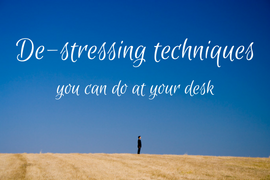 Stress is the feeling of being under so much pressure from the demands of life, such as work, money or relationships, that you feel unable to cope.
Stress is the feeling of being under so much pressure from the demands of life, such as work, money or relationships, that you feel unable to cope.
This feeling is actually hormones like cortisol flooding our systems, causing our heart rate to increase, our breathe to quicken and our blood vessels to increase the oxygen to our heart and muscles.
Think of it as like a ‘fight or flight’ response. We still have this instinct from our ancestors that once helped us escape predators in the wild. However, now this physical response is triggered by the stresses that come from modern life, such as an argument with a family member, an impending deadline, an exam or a new baby.
In the moment, this response can be useful in dealing with situations in which you need to act quickly, but long term, it can have serious health implications.
The NHS has reported a ‘sharp rise in hospital admissions for stress.’ Whilst this is on the extreme end of the scale, stress can cause more short and long term health implications than you might think.
Stress has been linked long term to depression, heart disease, sexual dysfunction, diabetes, obesity and hyperthyroidism among other serious conditions.
What’s more, the short term symptoms of stress in themselves can be hard to deal with, particularly on top of the pressure you may already be feeling.
These can include, but are not limited to, sleeping problems, decreased cognitive ability, loss or increase of appetite, low self-esteem, headaches, muscle tension or digestion problems.
So that’s all the more reason to try out these de-stressing techniques at your desk next time feel like the pressure is getting too much. And don’t just wait until you feel the stress coming on – if you do these techniques regularly, they can act as a prevention as well as a cure.
Breathing
Combat the ‘fight or flight’ response with very simple breathing techniques which reverse the physical signs of stress by slowing your heart rate, stabilising your blood pressure and relaxing your muscles. The NHS suggests starting with this simple exercise:
- Let your breath flow as deep down into your belly as is comfortable, without forcing it.
- Try breathing in through your nose and out through your mouth.
- Breathe in gently and regularly. Some people find it helpful to count steadily from one to five. You may not be able to reach five at first.
- Then, without pausing or holding your breath, let it flow out gently, counting from one to five again, if you find this helpful.
- Keep doing this for three to five minutes.
Go for a ten-minute walk
Not only does the physical act of walking increase endorphins (stress hormones’ worst enemies), but at the same time will allow for some ‘head-clearing.’ Walking can actually put your brain into a meditative state, as it lulls you into a place of reflection. Not only this, but studies have found that just being outdoors boosts your energy levels and alleviates stress.
Meditation
We’re not suggesting adopting the lotus position and starting to ‘ohmm’ in the middle of the office. There are lots of apps (such as Headspace and Bhuddify) that you can download to guide you via your headphones through short meditation sessions to help you relax, think positively and order your thoughts. Take ten minutes, find somewhere quiet and feel your stress melt away.
Get away from your screen
Stepping away from your screen is also good for you, as too much time in front of a computer screen has been linked to stress, depression and lack of sleep. Take breaks from your computer (and smart phone) to give your brain a break and try turning your laptop or phone off an hour before bed for a better night’s sleep.
Get enough exercise and eat a healthy diet
Caring for your body outside of work has a huge impact on how you cope with stress in the workplace.
Exercising regularly improves cognitive function, boosts your mood and can even make you smarter, as well as giving you that immediate endorphin hit.
Eating little and often throughout the day keeps your metabolism ticking over, which helps stabilise your blood sugar levels. Foods which have been shown to boost energy include those containing B vitamins (leafy greens, nuts, avocados, meat, fish, dairy). Your adrenal glands, which are important for producing stress hormones, contain lots of vitamin C, so replenish your stores by eating citrus fruits, tomatoes and peppers. Finally, magnesium relaxes muscles and reduces anxiety, so add wholegrains and nuts to your diet.
